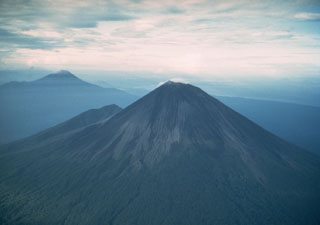Report on Ulawun (Papua New Guinea) — 28 November-4 December 2012
Smithsonian Institution / US Geological Survey
Weekly Volcanic Activity Report, 28 November-4 December 2012
Managing Editor: Sally Sennert.
Please cite this report as:
Global Volcanism Program, 2012. Report on Ulawun (Papua New Guinea) (Sennert, S, ed.). Weekly Volcanic Activity Report, 28 November-4 December 2012. Smithsonian Institution and US Geological Survey.
Ulawun
Papua New Guinea
5.05°S, 151.33°E; summit elev. 2334 m
All times are local (unless otherwise noted)
RVO reported that starting on 6 November through 30 November Ulawun produced pale grey and brown ash plumes that rose 200 m and drifted in multiple directions. Ashfall was reported on the N and NW flanks, in Voluvolu, Noau, Ubili (10 km NW), and Ulamona (10 km NW). Low rumbling was heard on 18 November.
Geological Summary. The symmetrical basaltic-to-andesitic Ulawun stratovolcano is the highest volcano of the Bismarck arc, and one of Papua New Guinea's most frequently active. The volcano, also known as the Father, rises above the N coast of the island of New Britain across a low saddle NE of Bamus volcano, the South Son. The upper 1,000 m is unvegetated. A prominent E-W escarpment on the south may be the result of large-scale slumping. Satellitic cones occupy the NW and E flanks. A steep-walled valley cuts the NW side, and a flank lava-flow complex lies to the south of this valley. Historical eruptions date back to the beginning of the 18th century. Twentieth-century eruptions were mildly explosive until 1967, but after 1970 several larger eruptions produced lava flows and basaltic pyroclastic flows, greatly modifying the summit crater.
Source: Rabaul Volcano Observatory (RVO)

